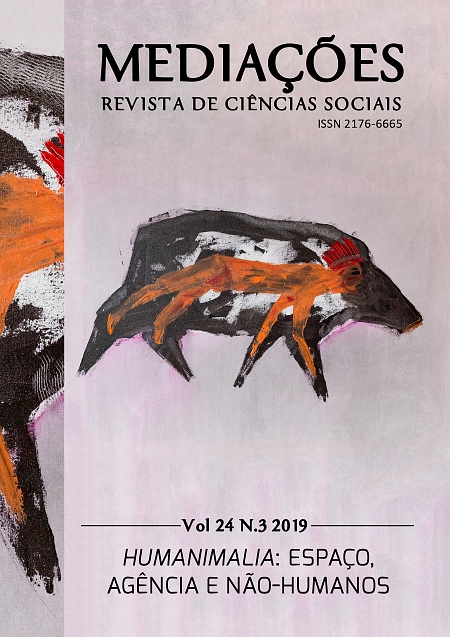The language of violence: the political theory of Giorgio Agamben
DOI:
https://doi.org/10.5433/2176-6665.2019v24n3p100Keywords:
Violence, Language, Giorgio Agamben, Political theoryAbstract
Understanding the problem of violence in contemporary societies is fundamental to any political and social theory that claims to be critical, especially when it is experienced by minority groups. In today's Brazil, this issue became urgent to social sciences and philosophy researchers. The aim of this essay is to show that the political theory elaborated by the philosopher, essayist and law theorist Giorgio Agamben provides suggestive theoretical and conceptual axes for interpreting the issue of violence as a constituent phenomenon of contemporary societies, and especially of Brazilian society. To show the scope of this approach, we propose to analyze, based on the Agambenian political theory, a particular case of violence, that of Cláudia Silva Ferreira, which occurred in Brazil in 2014.Downloads
References
AGAMBEN, G. Estado de exceção. São Paulo. Boitempo, 2004.
AGAMBEN, G. Homo Sacer. Belo Horizonte. Editora UFMG, 2007a.
AGAMBEN, G. O que é o contemporâneo? Chapecó. Unichapecó, 2009.
AGAMBEN, G. O que resta de Auschwitz. São Paulo. Boitempo, 2008.
AGAMBEN, G. Profanações. São Paulo. Boitempo, 2007b.
ARAUJO, C.; ROMANELLI, S. Teoria política hoje no Brasil. In: MARTINS, C. B.; LESSA, R. (org.). Ciência política. São Paulo. Barcarolla, 2010.
ARENDT, H. Reflections of violence. New York Review of Books, New York. Feb. 17, 1969.
BALL, T. Aonde vai a teoria política? Sociologia e Política, Curitiba, v. 23, p. 9-22, 2004.
BROWN, W. At the Edge. Political Theory, Beverly Hills, v. 30, n. 4, p. 556-576, 2002.
BROWN, W. Resisting Left melancoly. Boundary, New York, v. 26, n. 3, p. 19-27, 1999.
CHRISTOVÃO, N. T. Os 111 laudos necroscópicos do massacre do Carandiru: primeiras observações. In: MACHADO, M. R.; MACHADO, M. R. A. (org.). Carandiru não é coisa do passado. São Paulo: FGV Direito, 2015. p. 135-157
COLILLI, P. The materials of modernity (On Giorgio Agamben). Italica, Menasha, v. 85, n. 4, p. 465-480, 2008.
EK, Richard. Giorgio Agamben and the spatialities of the camp: an introduction. Geografiska Annaler. Series B, Human Geography, Norwich, v. 88, n. 4, p. 363-386, 2006.
FERREIRA, B. O nomos e a lei: considerações sobre o realismo político em Carl Schmitt. Kriterion, Belo Horizonte, v. 49, n. 118, p. 327-366, 2008.
FERREIRA, B. O risco do político: crítica ao liberalismo e teoria política no pensamento de Carl Schmitt. BeloHorizonte: UFMG, 2004.
FERREIRA, L. M. A.; MACHADO, M. R. A.; MACHADO, M. R. Massacre do Carandiru vinte anos sem responsabilização. Novos Estudos Cebrap, São Paulo, n. 94, p. 5-29, 2012.
GIACOIA JUNIOR, O. Sobre direitos humanos na era da biopolítica. Kriterion, Belo Horizonte, n. 118, p. 267-308, 2008.
JORNAL FOLHA DE SÃO PAULO, São Paulo, 18 mar. 2014. Caderno Cotidiano.
KING, R. H. Old problems/new departures: american political thought since 1960. The History Teacher, Long Beach, CA, v. 24, n.1, p. 99-112, 1990.
MAYER, A. A dinâmica da contrarrevolução na Europa, 1870-1956: uma estrutura analítica. São Paulo. Paz e Terra, 1977.
MIGUEL, L. M. Violência e política. Revista Brasileira de Ciências Sociais, São Paulo, v. 30, n. 88, p. 29-44, 2015.
PAN, D. Against biopolitics: Walter Benjamin, Carl Schmitt, and Giorgio Agamben on political sovereignty and symbolic order. The German Quarterly, Carolina do Norte, v. 82, n. 1, p. 42-62, 2009.
PARIJS, P. Van. Demos-Cracia para a união europeia: por que e como. In: LAVALLE, A. G.; VITA, Á.; ARAUJO, C. (org.). O papel da teoria política contemporânea: justiça, constituição, democracia e representação. São Paulo. Alameda, 2015.
SCHMITT, C. A crise da democracia parlamentar. São Paulo: Scritta, 1996.
SCHMITT, C. Teologia política. Belo Horizonte. Del Rey, 2006.
STRAUSS, L. What Can We Learn from political theory? The Review of Politics, Paris, v. 69, n. 4, p. 515-529, 2007.
TAVARES, F. M. M.; OLIVEIRA, I. C. Omissões e seletividade da ciência política Brasileira: lacunas temáticas e seus problemas sócio-epistémicos. Revista Brasileira de Ciência Política, Brasília, n. 19, p. 11-45, 2016.
TELLES, E.; SAFATLE, V. O que resta da ditadura. São Paulo: Boitempo, 2010.
VATTER, Miguel. In odradek's world: bare life and historical materialism in Agamben and Benjamin. Diacritcs, Baltimore, v. 38, n. 3, p. 45-70, 2008.
VINCENT, Andrew. The nature of political theory. New York. Oxford University Press, 2004.
WARREN, M. What Is political theory/philosophy? Political Science and Politics, New York, v. 22, n. 3, p. 606-612, 1989.
Downloads
Published
How to Cite
Issue
Section
License
Copyright (c) 2019 Ronaldo Tadeu de Souza

This work is licensed under a Creative Commons Attribution 4.0 International License.
Copyright on articles published in Mediações belongs to the author(s): in the case of partial or entire republication of the original publication, we ask author(s) to indicate the original publication in the periodical.
Mediações uses the Creative Commons Attribution 4.0 International license, which allows Open Access, enabling any user to read, download, copy and disseminate its content so long as adequately referenced.
The opinions expressed by the author(s) are their sole responsibility.
































